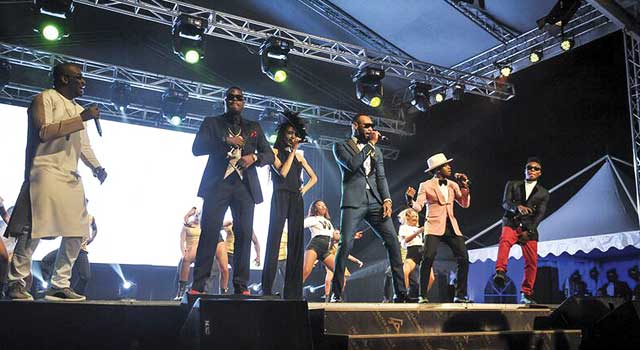It is no secret that Afrobeats is the popular genre around town currently. A friend joked that he visited a remote city somewhere in South East Asia recently and almost thought he was transported by a genie to the bubbling city of Lagos Nigeria because shop after shop he entered, he heard the strong vibes of Afrobeats. This is kudos to the likes of Wizkid, Davido, Burna Boy, Shatta Wale, and a host of others leading the way in the progression of music from the African continent. The truth is that Afrobeats is not only spreading but is also mutating even in the Queen’s own Country.
Initially synonymous with artists directly from the continent, it is important to note that the British African diaspora has played a huge role, not only in progressing Afrobeats but also in creating sub-genres that resemble the vibrant Afro-centric sounds from the Motherland.
In the city of London, British citizens have been influenced strongly by Afrobeats and dancehall, due to the vibrant black society in the U.K, which consists predominantly of Africans and West Indians.

[READ MORE: The Nigerian Afrobeats Music Industry Gains Global Momentum]
The cultural diversity in London and the acceptance of Afrobeats created two sub-genres that have shaped the U.K music scene. The first genre is U.K Afrobeats, while the other is called Afro swing. U.K Afrobeats from the African continent involves artists singing over traditional Afro sounding beats with their mother tongue; however, it varies slightly mainly because of their glaring British accents.
The likes of S.K, Sona, Kwamz & Flava, BM, Eugy, and Afro B are just some of the few pioneers that are flying the U.K Afrobeats flag high. The target audience for this genre was initially for the African Diaspora in Britain; however, as time progressed, people from across the pond in the United States and Canada gravitated to U.K Afrobeats.
One artist that benefitted handsomely from this new-found audience in North America is Afro B. His 2018 smash hit “Joanna” became frequently played on U.S song radio. The song “Joanna” even had a few remixes. One, in particular, featured French Montana, a Grammy-nominated American rapper from the Bronx, New York. As a result of Joanna’s triumph in the American market, Afro B was able to sign to EMPIRE, an American distribution and recording company that was founded by Ghazi Shami in 2010.

Afro Swing, on the other hand, is different from U.K Afrobeats. This genre of music involves a mixture of Afrobeats, Dancehall, hip-hop, R&B, reggae and grime. The sound of music developed originally in the mid-2010s; however, in recent times, people in the U.K saw the genre as a much-preferred alternative to U.K Afrobeats because it was more inclusive of all other cultures and also because the content of music was not as repetitive as U.K Afrobeats.
The blend of West African and Caribbean culture in this genre has produced reputable artists like J Hus, who was famous for his 2017 smash hit, “did you see,” as well as Not3s, who released hot singles like “Addison Lee,” “Aladdin,” “My Lover” and “Just Fine.” Other notable artists popular within the Afro Swing genre include the like of Kida Kudz, Kojo Funds, Yxng Bane, NSG, Lotto Boyz, Tion Wayne, Belly Squad, Mo Stack, Stefflon Don and many more.
The Afro Swing has generated some momentum over the past couple of years despite the popularity of Heavy Metal and has, in turn, had a knock-on effect on the net worth of the U.K music industry. According to Music Week, a popular trade paper for the U.K record industry, the U.K music industry grew by 2% in 2017 and it contributed about 4.5 billion pounds to the economy.
In addition, Music Week reported that the exports of the whole U.K music sector grew by 7% and was valued at 2.6 billion pounds. It also stated that employment within the U.K music sector increased by 3%.
The reason for this growth could be credited to the like of J Hus, who released his Afro Swing debut album titled “Common Sense” on May 12, 2017 and Not3s, who released his first mixtape “Take Not3s” on November 17, 2017, as well as others like Kojo Funds, who released the critically acclaimed song, “Dun Talkin,” with his fellow East London rapper, Abra Cadabra, and Yxng Bane, who had the eclectic single, “Vroom,” which stole the hearts of the ladies.
The dynamics of Afro Swing has spread across the world and it is becoming more familiar around nightclubs in Europe and America. As a result of Afro swing’s consistent trajectory, artists from the U.K are signing to more major labels in the United States. This is the case for Stefflon Don, who penned down a new deal with Quality Control Music, an Atlanta based record label founded by Kevin “Coach K” Lee and Pierre “Pee” Thomas, that has a joint venture partnership with Capitol Music Group and Motown Records.
[READ ALSO: Marvel’s Avengers: Endgame beats Titanic’s $2.12bn box office record]

Both genre, Afro Swing or U.K Afrobeats, are indicative of two things, the influence and preservation of culture through music. They tell a larger story of the African convoluted journey from the motherland to the Caribbean through slavery to the journey from the Caribbean’s to Britain, from the African journey from the independent African State post the scramble and partitioning seeking greener pastures in the Country of the Colonizer – strange convergence which has initiated the black man into the Common Wealth of Nations.
These contemporary genres are curious hybrids of the very past, near past and the now. They also represent how the black population has contributed to the growth of the British economy through music. It is through this Afrocentric sounds that black people in the U.K celebrate their heritage and distinguish themselves from other racial demographics in the country.
For UK, this is one potential export that defies the physical boundaries, perhaps good news if and when Brexit happens. A fundamental question still remains – who should own the proprietary rights of Afrobeat?
Paul Olele Jnr writes from Washington DC. He is a 2019 graduate of George Washington University and currently works as graduate Media and Research Intern at the Initiative for Global Development.














